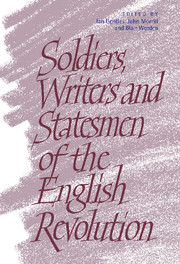Book contents
- Frontmatter
- Contents
- Preface
- Austin Woolrych: an appreciation
- 1 Secret alliance and Protestant agitation in two kingdoms: the early Caroline background to the Irish Rebellion of 1641
- 2 Of armies and architecture: the employments of Robert Scawen
- 3 George Digby, Royalist intrigue and the collapse of the cause
- 4 The iconography of revolution: England 1642–1649
- 5 The casualties of war: treatment of the dead and wounded in the English Civil War
- 6 ‘A bastard kind of militia’, localism, and tactics in the second civil war
- 7 Cromwell's commissioners for preserving the peace of the Commonwealth: a Staffordshire case study
- 8 Colonel Gervase Benson, Captain John Archer, and the corporation of Kendal, c. 1644—c. 1655
- 9 Repacifying the polity: the responses of Hobbes and Harrington to the ‘crisis of the common law’
- 10 Equality in an unequal commonwealth: James Harrington's republicanism and the meaning of equality
- 11 John Milton and Oliver Cromwell
- 12 From pillar to post: Milton and the attack on republican humanism at the Restoration
- 13 ‘They that pursew perfaction on earth …’: the political progress of Robert Overton
- 14 Locke no Leveller
- A bibliography of the writings of Austin Woolrych, 1955-95
- Index
7 - Cromwell's commissioners for preserving the peace of the Commonwealth: a Staffordshire case study
Published online by Cambridge University Press: 10 November 2009
- Frontmatter
- Contents
- Preface
- Austin Woolrych: an appreciation
- 1 Secret alliance and Protestant agitation in two kingdoms: the early Caroline background to the Irish Rebellion of 1641
- 2 Of armies and architecture: the employments of Robert Scawen
- 3 George Digby, Royalist intrigue and the collapse of the cause
- 4 The iconography of revolution: England 1642–1649
- 5 The casualties of war: treatment of the dead and wounded in the English Civil War
- 6 ‘A bastard kind of militia’, localism, and tactics in the second civil war
- 7 Cromwell's commissioners for preserving the peace of the Commonwealth: a Staffordshire case study
- 8 Colonel Gervase Benson, Captain John Archer, and the corporation of Kendal, c. 1644—c. 1655
- 9 Repacifying the polity: the responses of Hobbes and Harrington to the ‘crisis of the common law’
- 10 Equality in an unequal commonwealth: James Harrington's republicanism and the meaning of equality
- 11 John Milton and Oliver Cromwell
- 12 From pillar to post: Milton and the attack on republican humanism at the Restoration
- 13 ‘They that pursew perfaction on earth …’: the political progress of Robert Overton
- 14 Locke no Leveller
- A bibliography of the writings of Austin Woolrych, 1955-95
- Index
Summary
Cromwell's commissioners for preserving the peace of the Commonwealth are the invisible men of Interregnum politics. They were the special agents appointed by the Lord Protector to assist the Major-Generals during their brief rule between 1655 and 1656. Yet while much has been written about their military superiors, an almost complete veil of anonymity surrounds these officials. Virtually the only modern historian to be impressed by the commissioners and their work is Stephen Roberts in his fine study of Devon during the period 1646—70; for him they possessed ‘the ultimate bureaucratic virtue': ‘thoroughness’.
Manifestly it is high time Cromwell's commissioners were rescued from oblivion and in this essay an in-depth case study will be made of his appointees in Staffordshire, focusing on certain key issues. Were they a set of colourless nonentities? Is it fair to characterise them, as Ronald Hutton has done, as ‘usurpers within the social as well as the political (and often the religious) order'? And what of Ivan Roots' assertion that the Major- Generals and their helpmates ‘were a heterogenous lot' especially in terms of their ‘age, education, experience and so on'? Hopefully our investigation will answer these questions and in the process throw new light on the character of local government personnel during what David Underdown has described as the revolutionary phase of the Protectorate when direct military rule temporarily superseded traditional methods of 'settlement’.
In the ‘cantonisation' of the nation in October 1655, Staffordshire was associated with Cheshire and Lancashire and placed under the authority of Major-General Charles Worsley, an uncompromising zealot determined in his own words ‘to strike while the iron is hott' and to be ‘a terror to the bad’.
- Type
- Chapter
- Information
- Soldiers, Writers and Statesmen of the English Revolution , pp. 151 - 182Publisher: Cambridge University PressPrint publication year: 1998
- 1
- Cited by



